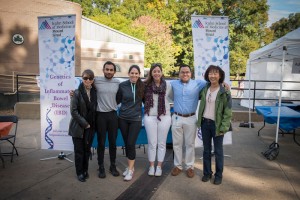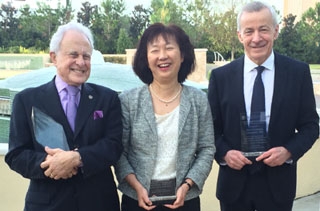Shikha Nayar present in Work in Progress (WIP) for Genetic and Genomic Sciences at Sinai
Date: 3/21/2018
Using single cell RNA sequencing to understand host-pathogen interaction of Crohn’s disease in a zebrafish model.
Ling-shiang (Felix) Chuang presented at ASCB/EMBO Minisymposium: Bactrerail Infection and Symbiosis on December 2-6 2017
Shikha Nayar and Ling-shiang (Felix) Chuang from Cho lab presented posters at American Society for Cell Biology (ASCB/EMBO) on December 2-6 2017
Single cell RNA sequencing of zebrafish intestines reveals enhanced inflammatory signatures in chemically‐induced intestinal
Zebrafish modeling defines complex innate immune mechanisms in sepsis and repetitive intestinal
Congratulations to Cho Lab members (past and present) for the publication of “Improved integrative framework combining association data with gene expression features to prioritize Crohn’s disease genes.”
One of the greatest challenges in Crohn’s disease (CD) research today is making sense of the 100+ loci from genome-wide association studies (GWAS) that increase patient risk for this multifactorial disease. Some of the known risk loci span multiple genes, and others appear to be gene deserts. In order to improve available therapies for this disease, we need to refine and prioritize the most probable candidate genes in each locus in order to properly target and treat CD.
By integrating known associations with gene expression features such as tissue specificity, regulatory variants and differential expression in patients and healthy controls, we show that an integrative model outperforms GWAS alone in ranking the evidence for a gene being involved in CD. Moreover, this refined set of genes is more likely to be differentially expressed in polarized proinflammatory macrophages (M1), suggesting that host control of inflammation is central to the pathology of this disease.
As research into the genetics of CD expands, the list of associated loci will follow suit. Incorporating models that include more information than genotype alone will be crucial to understanding which genes in each locus are likely contributing to this disease and how they change under certain conditions to result in disease. By collecting biological specimens from multiple sources, including intestinal biopsies and peripheral blood samples, and combining this data with results published by other groups, we can significantly expand the types of analyses performed and improve our understanding of Crohn’s disease.
Citation
Kaida Ning, Kyle Gettler, Wei Zhang, Sok Meng Ng, B. Monica Bowen, Jeffrey Hyams, Michael C. Stephens, Subra Kugathasan, Lee A. Denson, Eric E. Schadt, Gabriel E. Hoffman and Judy H. Cho. Improved integrative framework combining association data with gene expression features to prioritize Crohn’s disease genes. Hum Mol Genet (2015). doi:10.1093/hmg/ddv142

By B. Monica Bowen



